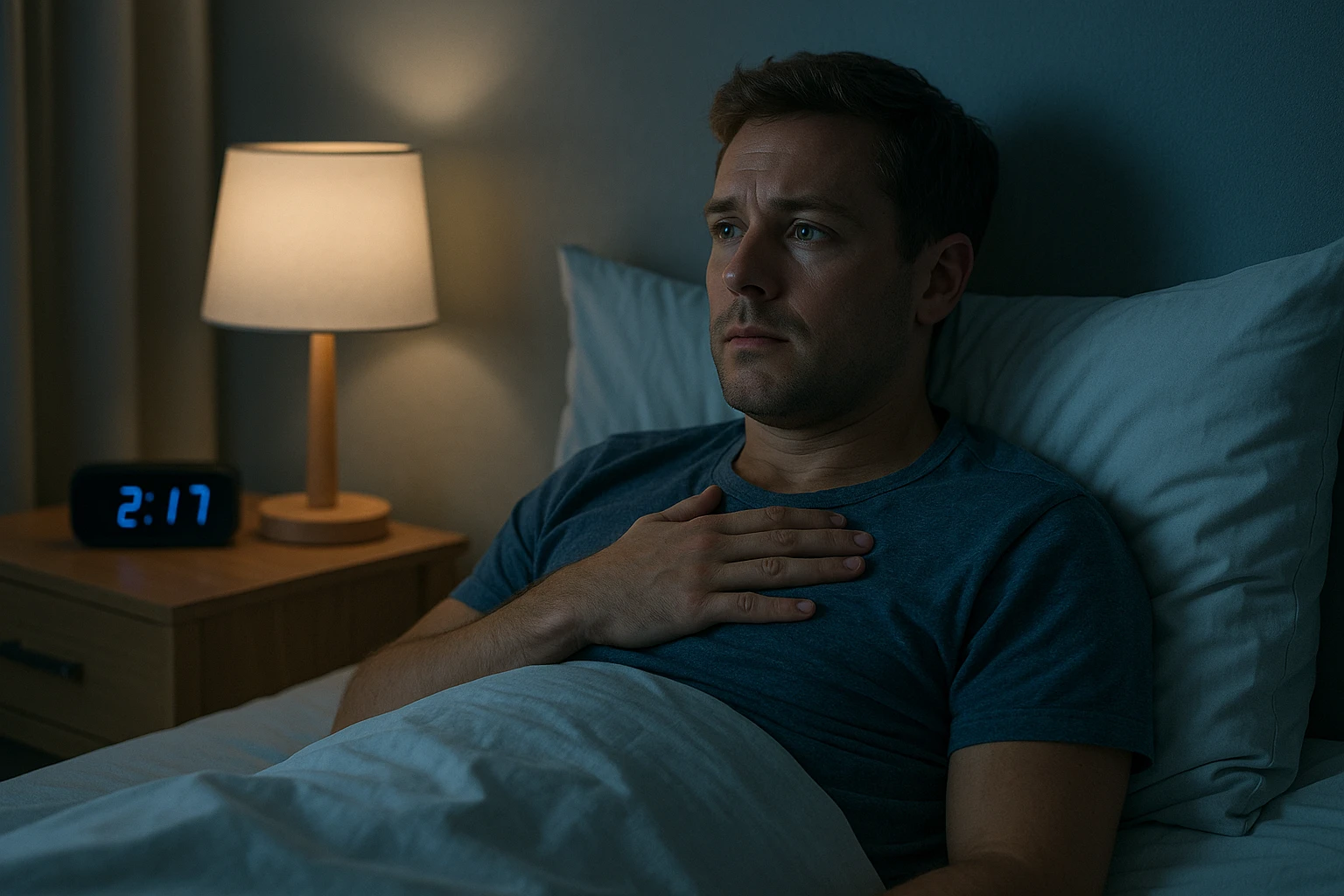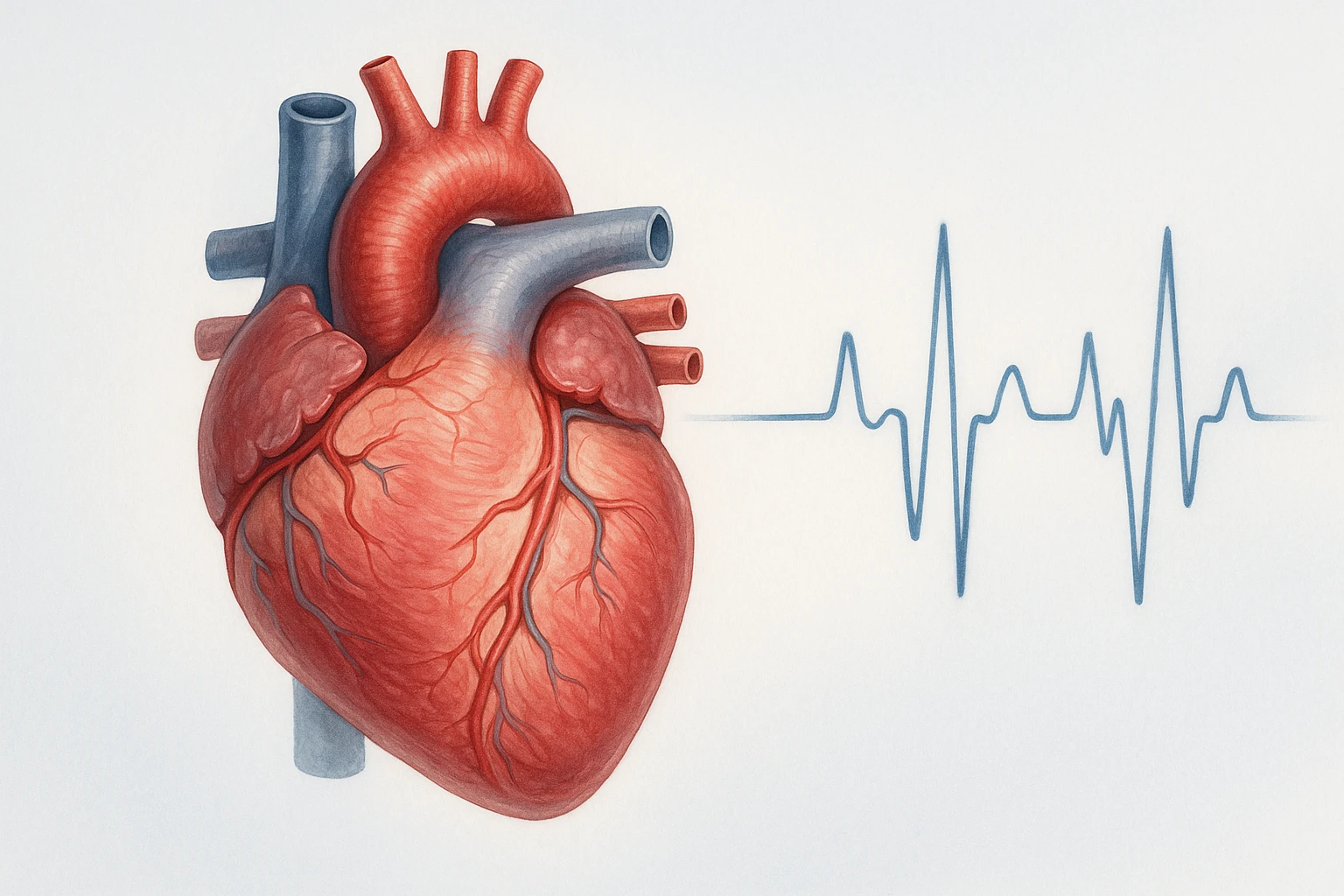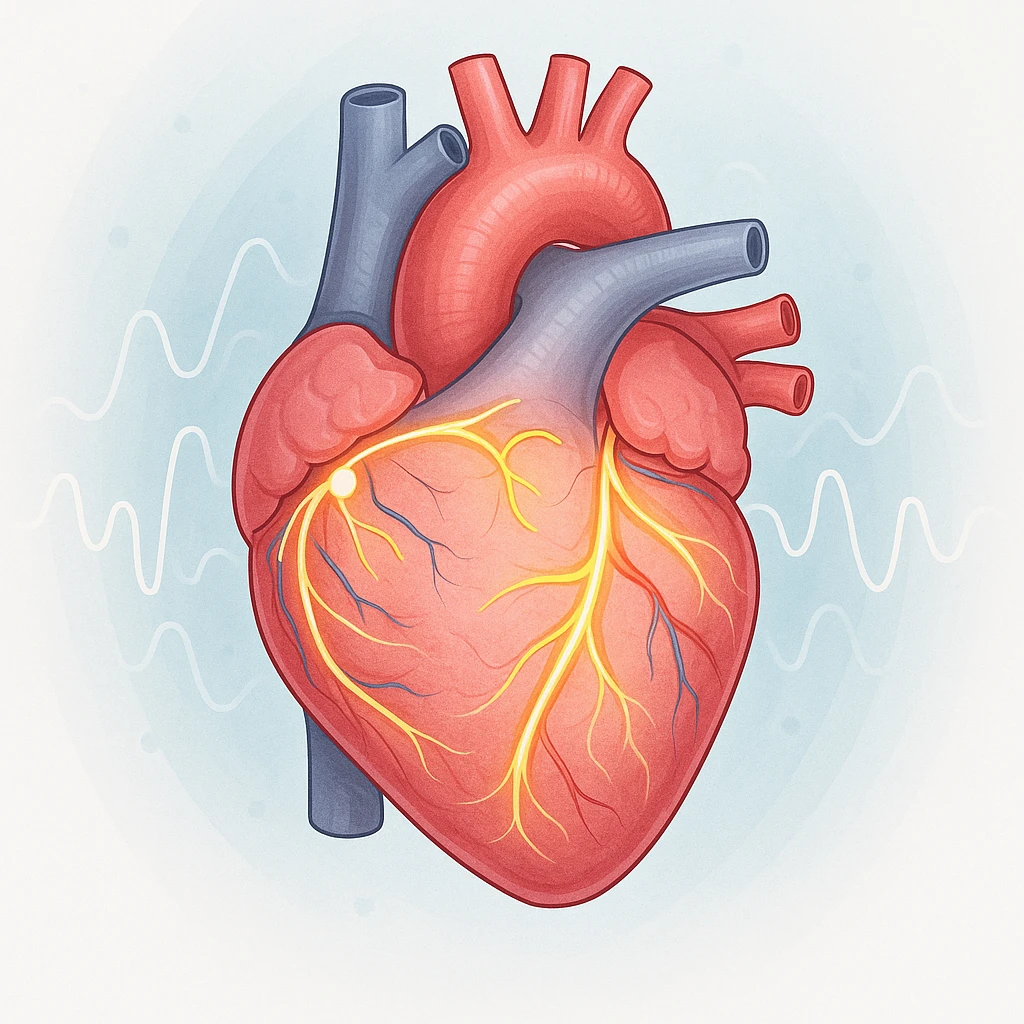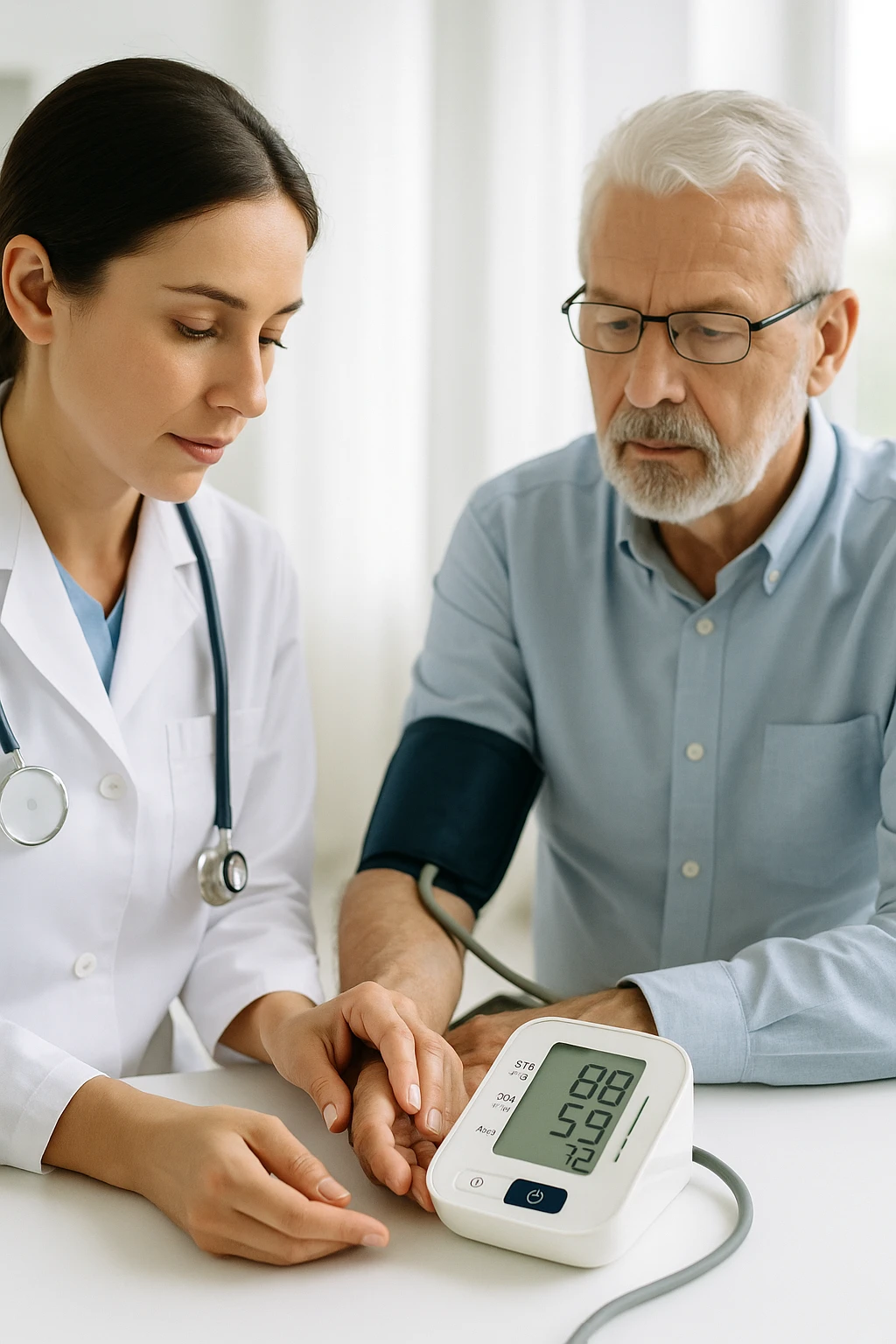Managing Heart Racing at Night and Improving Sleep Health
What It Means When Your Heart Races at Night
Defining Nighttime Palpitations
When a person becomes aware of their heartbeat at night, it is often described medically as a nocturnal palpitation. This term refers to the sensation of a rapid, pounding, or irregular heartbeat that occurs mainly during rest or while lying down. These sensations may be felt as the heart racing or fluttering in the chest, or as skipped or extra beats that can radiate toward the throat or neck. Many people notice them more clearly when the body is at rest because there are fewer distractions compared with the daytime.
- Rapid, pounding, or irregular heartbeat sensations
- Fluttering, skipped, or extra beats felt in the chest, throat, or neck
- More noticeable during rest or lying down
It is important to understand that feeling the heartbeat does not automatically indicate a heart problem. In most cases, the heart rhythm remains normal, but a person’s perception of it becomes heightened. Recognizing what these sensations are can help distinguish harmless palpitations from those that may need medical evaluation.
Why Heartbeats Feel Stronger at Night
Heartbeats can seem more intense or faster at night for several physiological and environmental reasons. When lying flat, blood shifts within the body, and changes in chest pressure can make each heartbeat feel more noticeable. The quiet environment typical of bedtime also removes background noise, allowing even normal cardiac activity to stand out more clearly. This heightened awareness can make a steady rhythm feel amplified, or a minor irregularity seem more pronounced.
- Body position changes blood flow and chest pressure
- Quiet surroundings make heartbeats easier to notice
- Stillness and focus increase awareness of normal rhythms
Additionally, being still and focused on bodily sensations can make subtle movements within the chest more apparent. The combination of physical position, silence, and relaxation allows the normal beating heart to feel stronger than it does during the day’s activity. Understanding these natural effects helps place occasional heart racing at night in perspective, highlighting that while it may feel unsettling, it is often a normal physiological experience rather than a sign of disease.
Everyday Triggers and Common Causes
Lifestyle and Dietary Triggers
Many nighttime episodes of heart racing are linked to daily habits that stimulate the body’s natural stress response. Substances such as caffeine, nicotine, and alcohol can all temporarily raise heart rate or make normal beats feel stronger. Caffeine and nicotine act as stimulants that increase alertness and activate the sympathetic nervous system, which may cause the heart to beat faster even at rest. Alcohol can have a similar effect, particularly when consumed close to bedtime, as it influences fluid balance and disrupts the normal rhythm of sleep and recovery.
- Caffeine and nicotine stimulate the nervous system and increase heart rate
- Alcohol can alter sleep patterns and fluid balance, raising heart awareness
- Dehydration forces the heart to pump harder to maintain circulation
Dehydration may also play a role by causing the heart to pump harder to maintain circulation when blood volume decreases. For some individuals, simply reducing stimulant intake later in the day and maintaining hydration can lessen how strongly the heartbeat is perceived at night.
Stress, Hormones, and Sleep Factors
Psychological stress and anxiety are among the most frequent non-cardiac reasons for feeling a racing heart at night. When the body remains on alert after a busy or emotionally charged day, stress hormones like adrenaline stay elevated, keeping heart rate higher than usual. This effect can become more noticeable in the quiet and stillness of bedtime. Relaxation techniques and consistent bedtime routines may help lower this residual tension and reduce awareness of palpitations.
- Emotional stress elevates adrenaline, increasing heart rate at rest
- Hormonal changes during menstruation, pregnancy, or menopause may trigger palpitations
- Sleep disruption or poor bedtime routines can heighten heart awareness
Hormonal changes can also make the heart more sensitive to fluctuations in the body’s chemistry. During periods such as menstruation, pregnancy, or menopause, varying hormone levels may alter how the heart responds to normal triggers, occasionally leading to brief sensations of fluttering or racing. These episodes are typically short-lived and not dangerous but can be unsettling when they occur.
Position and Environment
The way a person lies in bed can influence how prominently heartbeats are felt. Lying flat can shift blood flow and increase pressure in the chest cavity, which may make the heartbeat feel stronger against the chest wall. Some people also notice palpitations more when lying on the left side, where the heart is closer to the chest surface. The quiet of the nighttime environment can heighten these perceptions, as fewer external sounds compete for attention.
- Lying flat increases chest pressure and may amplify heartbeat sensations
- Left-side sleeping positions can make the heartbeat more noticeable
- Quiet surroundings make natural rhythms easier to perceive
Understanding these positional and environmental effects helps explain why a normal heartbeat may seem more intense after lying down. Recognizing these benign influences can reduce anxiety and make it easier to interpret heart racing at night as a common, often harmless experience.
Underlying Health Conditions to Consider
Heart Rhythm Disorders
Some episodes of heart racing at night are related to changes in the heart’s electrical rhythm. Conditions such as supraventricular tachycardia and atrial fibrillation can cause the heart to beat rapidly or irregularly, sometimes awakening a person from sleep. These rhythm disturbances can occur in otherwise healthy hearts but may also be linked to structural or electrical abnormalities within the heart tissue. When present, they often produce sensations of fluttering, pounding, or skipped beats that differ from the mild palpitations caused by lifestyle factors.
- Supraventricular tachycardia (SVT) and atrial fibrillation may cause rapid or irregular heartbeats during sleep
- Structural heart disease or ventricular arrhythmias are less common but more serious causes
- Symptoms can overlap with benign palpitations, making medical evaluation important if episodes are frequent or severe
Less commonly, structural heart disease or ventricular arrhythmias may be responsible for nighttime palpitations. These conditions are more serious and typically occur in people with underlying heart disease or previous cardiac injury. Because their symptoms can overlap with benign palpitations, medical evaluation is important when heart racing is frequent or accompanied by chest discomfort, lightheadedness, or shortness of breath.
Systemic Conditions
Not all causes of nocturnal palpitations begin within the heart itself. Systemic or metabolic factors can increase heart rate as the body attempts to maintain normal function. Hyperthyroidism, for instance, raises metabolism and can provoke tachyarrhythmias that are especially noticeable at rest. Similarly, anemia forces the heart to beat faster to deliver enough oxygen to tissues when red blood cell levels are low. These conditions make the heart work harder even during sleep, leading to sensations of racing or pounding that may appear suddenly during the night.
- Hyperthyroidism increases metabolism and can trigger tachyarrhythmias
- Anemia leads to faster heart rate as the body compensates for reduced oxygen delivery
- Correcting the underlying imbalance can restore normal rhythm
Recognizing and treating these underlying systemic contributors can restore normal rhythm and relieve palpitations once the primary imbalance-thyroid overactivity or low blood count-is corrected.
Sleep Apnea Connection
Sleep-disordered breathing, particularly obstructive sleep apnea, has also been linked to episodes of heart racing during the night. In apnea, breathing briefly stops and oxygen levels drop, prompting the body to trigger an abrupt surge in heart rate as it restores normal airflow. These repeated cycles of low oxygen and increased cardiac effort can cause transient arrhythmias or strong heartbeat sensations as the body reacts to each breathing disturbance.
- Sleep apnea causes temporary pauses in breathing and oxygen drops
- The body responds with a sudden increase in heart rate to restore oxygen flow
- Recurrent episodes can produce transient arrhythmias or palpitations
Although these nighttime events are typically short-lived, persistent symptoms or loud snoring combined with palpitations may warrant evaluation for sleep apnea. Identifying and treating this condition not only reduces nocturnal palpitations but also supports long-term cardiovascular health.
Myth: Heart racing at night always means heart disease.
Fact: Most cases are triggered by benign or reversible factors, but persistent symptoms should be evaluated.
When to Seek Medical Evaluation
Red Flag Symptoms
While occasional nighttime heart racing is often harmless, certain symptoms require prompt medical attention. Palpitations that occur with chest pain, shortness of breath, or a feeling of pressure in the chest can signal an underlying cardiac condition. Likewise, if the heart races and is accompanied by dizziness, fainting, or a near-fainting sensation, these may indicate a transient drop in blood flow to the brain. Such events warrant immediate evaluation by a healthcare professional to rule out arrhythmia or more serious cardiovascular disease.
- Chest pain or pressure
- Shortness of breath or difficulty breathing
- Dizziness, fainting, or near-fainting spells
- Heart racing lasting several minutes or occurring frequently
Even in the absence of acute distress, frequent or prolonged episodes of heart racing at night should not be ignored. A pattern of nightly palpitations or episodes lasting several minutes may reflect a rhythm disturbance or a systemic issue that requires treatment.
When to see a doctor: Seek care promptly if heart racing is frequent, lasts several minutes, or occurs with chest pain, dizziness, or shortness of breath.
Diagnostic Steps
When evaluating nocturnal palpitations, clinicians begin with a detailed medical history and physical examination. Patients are usually asked about the timing of symptoms, potential triggers such as caffeine or stress, and any associated sensations like skipped beats or fatigue. A 12-lead electrocardiogram (ECG) is typically performed to assess heart rhythm and detect abnormalities that may occur during the visit.
- Medical history and physical exam: Identify triggers and associated symptoms
- 12-lead ECG: Evaluate heart rhythm during the visit
- Ambulatory monitoring: Holter monitors or event recorders capture intermittent nighttime events
If palpitations are intermittent and not captured on a routine ECG, the physician may recommend ambulatory heart rhythm monitoring. Devices such as Holter monitors or event recorders can continuously track cardiac electrical activity over hours or days, improving the likelihood of identifying an irregular rhythm that occurs only at night.
Laboratory and Sleep Studies
Depending on the findings of the initial evaluation, further tests may include blood work to assess thyroid function, anemia, or electrolyte levels-common systemic causes of rapid heartbeat. When sleep-related factors are suspected, such as snoring or disrupted breathing, a sleep study may be ordered to evaluate for sleep apnea. Identifying these contributing conditions helps clinicians address the root cause rather than just the symptom of heart racing.
- Thyroid and metabolic testing
- Blood count and electrolyte analysis
- Sleep study for suspected sleep apnea
Understanding what to expect during evaluation can help patients approach the process with confidence. Most cases are manageable once the cause is identified, and early assessment supports both reassurance and effective care.
Managing, Preventing, and Living Well with Nighttime Palpitations
Lifestyle and Self-Management
For most people, occasional heart racing at night can be minimized through practical lifestyle adjustments. Avoiding common triggers-such as caffeine, nicotine, alcohol, and large late-night meals-helps reduce the likelihood of nocturnal palpitations. Staying well hydrated supports normal circulation and can lessen sensations of pounding or fluttering. Because emotional stress also influences heart rhythm, incorporating relaxation techniques or maintaining a calming bedtime routine may further improve nighttime comfort.
- Avoid caffeine, nicotine, and alcohol in the evening
- Stay hydrated throughout the day
- Maintain a calming bedtime routine to reduce stress
- Keep meals light and avoid eating close to bedtime
Sleep habits play a significant role in preventing palpitations. A consistent sleep schedule, a dark and quiet environment, and limiting screen exposure before bed can all enhance sleep quality and reduce physiological arousal that contributes to palpitations. These straightforward measures form the foundation for managing benign nighttime heart racing without medication.
Medical Treatment and Follow-Up
When palpitations stem from an identifiable cardiac or systemic cause, treatment is tailored to the underlying condition. For example, arrhythmias such as supraventricular tachycardia or atrial fibrillation may require medications to control heart rate or rhythm, and occasionally, procedures to restore normal electrical activity. In other cases, managing thyroid disease, correcting anemia, or addressing sleep-disordered breathing can eliminate the trigger entirely.
- Arrhythmia management: Medications or corrective procedures as prescribed
- Thyroid or anemia treatment: Addressing metabolic or hematologic causes
- Sleep-related issues: Managing sleep apnea or breathing irregularities
- Routine follow-up: Periodic exams or ECGs to confirm stability
Ongoing follow-up with a healthcare provider ensures that treatment remains effective and that no new contributing factors develop. Periodic monitoring through physical exams or repeat electrocardiograms may be advised to confirm stability and provide reassurance.
Outlook and Prevention
Most individuals experiencing heart racing at night have a favorable outlook. When no underlying heart disease is present, palpitations are typically benign and manageable through lifestyle modification and stress reduction. However, maintaining healthy daily habits-such as balanced nutrition, moderate physical activity, and limiting stimulants-can significantly reduce recurrence.
- Follow a balanced, heart-healthy diet
- Engage in regular, moderate exercise
- Limit stimulants and alcohol
- Practice consistent sleep and stress management routines
Prognosis largely depends on whether structural or rhythm-related heart disease exists. In the absence of such conditions, nighttime palpitations rarely pose danger and often improve with consistent self-care. Recognizing and addressing triggers early allows most people to sleep comfortably and live well with a calm, steady heartbeat.
Frequently Asked Questions About Heart Racing at Night
- Is it normal for my heart to race when I lie down at night?
- Yes, many people notice their heartbeat more when lying down because the body is still and quiet. In most cases, this sensation is harmless and due to normal variations in heart rhythm.
- What triggers heart racing at night?
- Common triggers include caffeine, nicotine, alcohol, emotional stress, hormonal changes, and dehydration. Lying flat or sleeping on your left side can also make your heartbeat feel stronger.
- When should I be concerned about nighttime palpitations?
- Seek medical attention if your heart racing occurs with chest pain, shortness of breath, dizziness, or fainting. These symptoms may indicate a more serious heart rhythm issue.
- Can anxiety make my heart race before bed?
- Yes. Anxiety activates the body’s stress response, releasing adrenaline that temporarily raises heart rate. Relaxation techniques or a calming bedtime routine can help reduce this effect.
- Do certain health conditions cause heart racing at night?
- Yes. Arrhythmias such as supraventricular tachycardia or atrial fibrillation, as well as thyroid disease, anemia, or sleep apnea, can cause nighttime palpitations.
- How do doctors diagnose the cause of heart racing at night?
- Evaluation usually includes a medical history, physical exam, and electrocardiogram (ECG). If episodes are intermittent, your doctor may recommend a Holter monitor or sleep study.
- Can changing my lifestyle reduce nighttime palpitations?
- Often, yes. Avoiding caffeine and alcohol before bed, staying hydrated, and keeping a consistent sleep schedule can minimize nighttime heart racing.
- Is heart racing at night dangerous?
- Most cases are benign, especially when no heart disease is present. However, ongoing or severe symptoms should be evaluated to rule out underlying conditions.
- Does sleep position affect how strongly I feel my heartbeat?
- It can. Lying on the left side places the heart closer to the chest wall, making beats feel stronger or more noticeable for some people.
- Can hormonal changes cause palpitations at night?
- Yes. Fluctuations during menstruation, pregnancy, or menopause can make the heart more responsive to normal stimuli, leading to temporary sensations of racing or fluttering.













